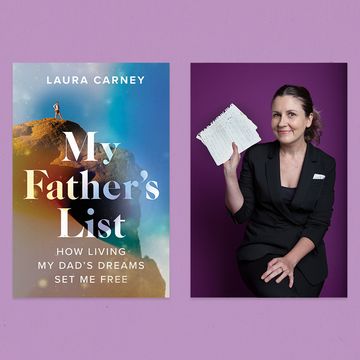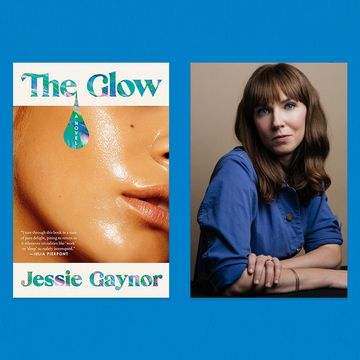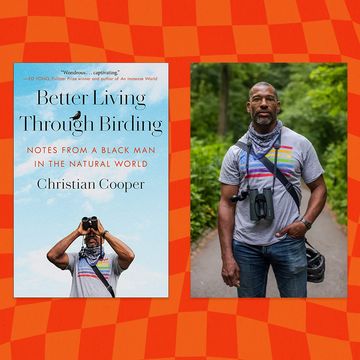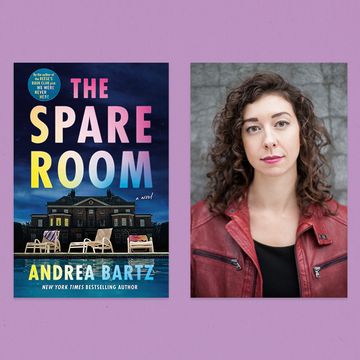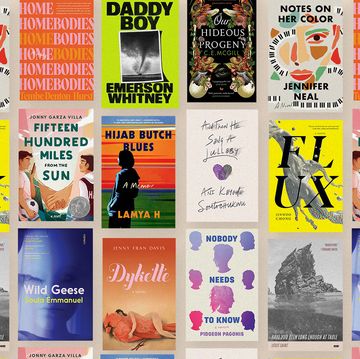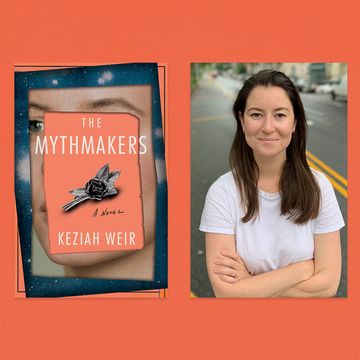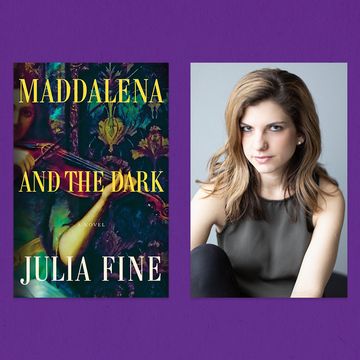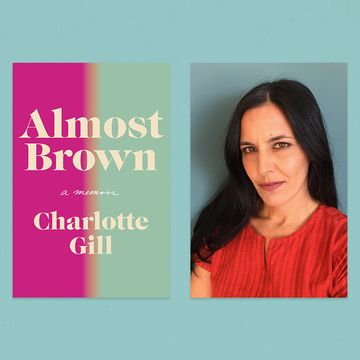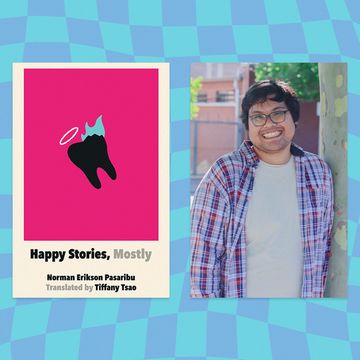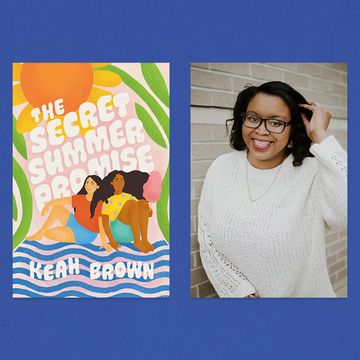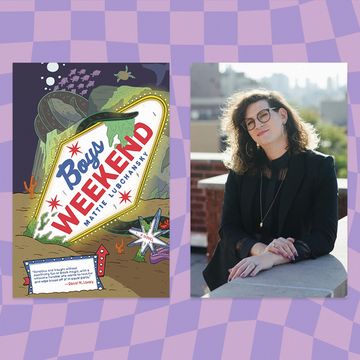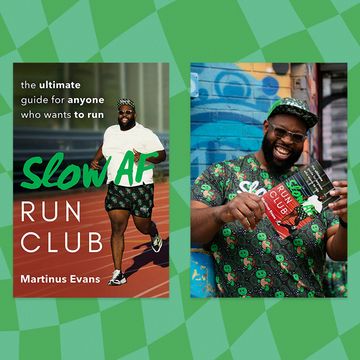In Liv Little’s debut novel, Rosewater, readers follow Elsie, a 20-something who just wants to write poetry but instead is dealing with her life falling apart. She’s lost her home, her job doesn’t pay enough, and the only person she has to turn to is Juliet, her childhood best friend. But as time goes on, Elsie wonders if there’s something romantic between her and Juliet that she didn’t recognize before. And Elsie must decide if she’s ready to embark on this new adventure. Rosewater is about navigating the messiness of life, being put in a financial position you can’t see your way out of, family dynamics, and love in all its forms.
Little is a British writer of Jamaican and Guyanese descent whose work encompasses TV, curatorial projects, journalism, and audio. She’s earned several honors including LGBTQI+ Broadcaster of the Year and Rising Star at WOW. Rosewater is her debut novel and the first release from John Legend’s new imprint, Get Lifted Books. The book also features poems from the performance poet, model, and trans activist Kai-Isaiah Jamal.
Shondaland spoke with Liv Little about complicated relationships, the pursuit of art, and found family’s impact during times of struggle.
ARRIEL VINSON: What was the inspiration for Rosewater?
LIV LITTLE: Something that is such an important part of my life is love — in different aspects of my life. I think romantic love is the thing that has held up as the most important and has been very inspirational and transformational for me. But I think with the relationships and love that I have between friends, family, chosen family, and also intergenerationally, I wanted to touch on the many different forms love can take and how it can shape your worldview and challenge you as a person and also help you grow.
And so, I think that’s why it was so important for me to have such a strong cast of really dynamic, different, but very strong women throughout the book who teach Elsie a lot of things, and who she also teaches a lot of things. In all of her relationships — whether that’s with her Nan, or whether that’s with her mom or Maggie — one thing that I really wanted to be clear about was that the characters who were slightly older didn’t just serve as a teacher.
For her, I wanted them to all be full, interesting individuals who are continuing to move through the world and fall in love and just take up space. All of those things were really important to me because sometimes there can be a tendency to make the older figure only there to offer a few words of wisdom, but they don’t always have a full personality.
I wanted to speak about the transformational nature of love, and I also wanted Rosewater to serve as a love letter to the women in my life.
AV: Rosewater is so unapologetic about queerness and love. Why was Elsie’s romantic journey throughout this novel so messy?
LL: It’s messy. It’s complicated. At the end of the day, the reason why I think that love is so important and so transformational is because to really be able to love someone, you have to be able to understand who they are and why they are who they are. I would hope that through mapping out Elsie’s journey — even from her grandma’s relationship with her mum, and her relationship with her mum, and even her relationship with Maggie — she exists and shows up in the world because of those people that have come before her, made space for her, birthed her, influenced her, informed her.
She’s very much a product of her environment. So, it’s not so straightforward or so easy for Elsie to just say, “Cool, I’m all in.” Because she’s scared. She’s scared of losing a close friend. She’s scared of being vulnerable. She’s scared of being rejected. She’s also going through so much that she’s not necessarily going to fully be able to see all of the things in front of her. She’s not even necessarily always able to see the vastness of love in front of her because she finds it hard to ask for help.
She wants to be completely self-sufficient, and I think there’s a balance to be struck between being self-sufficient and independent and also realizing that we need community to hold us up. And the irony is that her community is holding her up, even if she’s not able to fully lean into that. Her grandma’s so important to her, Juliet’s so important to her, but in terms of the romantic journey and that love, it’s scary to be vulnerable and to open yourself up to it not working.
AV: I want to go back to what you said about her community holding her up. There’s her found family, and there’s her real family — and we see that distance on the page and feel how estranged they are. How does her upbringing play a role in her current struggles as an adult?
LL: She has quite a strained and complicated relationship with her mom. And I think from her mom’s perspective, she’s doing the best she can for her children — “We’ve come to this country; we’re working hard. I want you to be great. You can take on these responsibilities” — because she was also juggling a lot. But actually, what that meant was Elsie wasn’t able to be a child and nurture and nourish herself because the amount of responsibility that she carried was so huge.
She carries so much resentment towards her mom and her dad for that, but at the same time, she has this beautiful relationship with her grandma. And she’s able to have that beautiful relationship with her grandma because there’s a different dynamic. There’s a moment in the book where realizes that her mom shows up in the world the way that she does because of her grandma and because of the trauma that she experienced being the child who was left back home in the Caribbean and coming to the country later.
So, it’s important for her to be able to see that whilst also recognizing and acknowledging the ways in which her upbringing has put her at a disadvantage. She got to an age where she was like, “I’m not doing this anymore. I can’t hold space for me and the expectation to be the perfect daughter.”
I think so often the responsibility to care and to nurture ends up falling on girl children as well.
AV: Especially the older one.
LL: Exactly. So, being self-sufficient from a super-young age has meant that things haven’t been straightforward. She had to try and navigate finances without having someone to support her in doing so, which equals debt and things that aren’t necessarily good for you.
She’s in a position in the start of the book where she’s losing her home, and it’s a product of so many different things. It’s not about one moment or one missed payment. It’s a series of events and lack of support and education — financial education and support. She’s done what she’s had to do to survive. And so, she’s in a really challenging place where she’s just been trying to hold it all together whilst also having crippling anxiety at the thought that the home that she finally was able to get is going to be taken away from her.
The psychological impact of that is huge. We see her having panic attacks and not feeling like she’s able to breathe. There’s nightmares where she’s haunted by this sense of feeling rootless. So, it’s no surprise that she’s not immediately like, “I want to fall in love.” She’s like, “I’m struggling, and I can’t even see the beauty in that right now.”
AV: This novel is also an exploration of housing and financial insecurity, especially in the pursuit of art. She works jobs that don’t pay well enough, but she just dreams of being a poet. Why did you make a commentary on this?
LL: I think it’s really important to hold space for and interrogate the ways in which different people’s journeys towards making art look. And also explore timelines and expectations about where you should be at a certain point. Elsie’s experience is different because if you don’t have parents or a family whose house you can live in whilst you’re in the pursuit of this art form, you are already at a disadvantage. If you can’t afford to work for free in the creative industries, you’re already at a disadvantage.
I remember in my early 20s, you’re juggling a lot in the pursuit of art or creativity, and that could have a really detrimental impact on your own mental health and well-being. And so, whilst Elsie’s experience is not mine, I think the feelings of panic, of terror, of feeling you have to figure stuff out — those things ring true. She’s confident about who she is. Her Blackness is not in question. Her queerness is not in question, and she also doesn’t question her talent. She knows that her voice is powerful and is important, and that was important to me.
It’s the rest of the world and other circumstances that are thrown at her. The lack of infrastructure for her to be able to take up space in the way that she wants to is so important. She’s got her own journey of self-love to go on, but when she’s writing and performing poetry is when she is at home.
The reality is until you are at a certain level, you are always going to have to be juggling and making compromises in order to survive and also try to make art. What would Elsie be able to do if she just had the freedom to create?
AV: Ultimately, this is a story about finding yourself, healing, learning to navigate adulthood but also being lost, afraid, ashamed. Why was her coming of age, or coming into later adulthood, explored?
LL: Because it’s hard. I’m 29 now, so when I started writing it, I was 26. I suppose it was a very transitory period in my life where I was figuring a lot of things out, so I was very reflective. We assume that one can only come of age much younger. What does that look like later in life? We set so many expectations on certain numbers, but for me, the end of my 20s or mid-20s just started feeling like things were getting so real. I’d lost a stepparent I was caring for and going through the process of losing my dad. I’d quit this job. I moved out of the city. It was a really big period of transition. And in some way, maybe subconsciously, that’s why Elsie too, at a similar age, was navigating so much.
I think 28 is incredibly young, but the stakes are a little higher, and that’s so important. Maybe if she was 21 and still living at home, the not knowing of what is coming next wouldn’t feel so daunting. But at a period when everyone is telling you to have your s--t figured out, it’s terrifying.
AV: Earlier, you said that aside from Elsie’s poetry, sex is where she finds her power. Tell me more about that.
LL: Every intimate moment that she shares with someone really tells you something about her and how she moves through the world. And how she feels most powerful and in control. In the beginning, there are moments where she sees Leonie, and you can see that the power dynamic is that she’s handling things and taking control. That’s a space where she feels really comfortable in the sexy things she can do. She knows how to speak to women; she knows how to be charming and sexy. And then when she has sex with Bea, it’s quite different. They’re meeting each other on a more level playing field. And then when she’s intimate with Juliet, that dynamic shifts, and she allows herself to receive pleasure in a way that she doesn’t ordinarily, and the touch feels different.
It was never to write sex for sex’s sake. It was a part of how we relate to the world and to other people, and it tells us something about relationships. It would’ve been strange to have written a book about love — in all of its different forms — and about navigating life without having sex play some part in it.
One of my favorite authors is Nicole Dennis-Benn. I read Here Comes the Sun not knowing what it was about, and it changed my worldview. It was the first time that I really felt seen and that I’d seen queer relationships between Black women explored. But I think the general feeling has been that there’s a desire for more as well. Let’s have even more stories where we’re able to explore those intimate dynamics. And so, I think it’s something that people have found quite refreshing — seeing consensual, sexy moments between queer Black women. This is also my experience, and I’m writing it from a place of love.
AV: Lastly, what are you working on now?
LL: I have a two-book deal in the U.K., so I need to be starting on that. And I’m trying to step more into the TV and film space, so I’ve got a few projects in development there, which is all super-exciting. The book’s been optioned, so that’s in development, and that’s fab.
I just want to keep writing. I’m really interested in messy, flawed, complicated people, imperfect people — as we all are. Those are the stories that I want to keep writing. I tend to have a lot of queer protagonists or characters in my work, and I want to keep doing that in a way where their queerness or coming out is not the story — it’s their lives, their full lives. So, that’s where I’m at. I just want to keep making stuff.
Arriel Vinson is a Tin House workshop alumna and Hoosier. She earned her MFA in Fiction from Sarah Lawrence College and received a B.A. in Journalism from Indiana University. Her poetry, fiction, and essays have appeared or are forthcoming in Catapult, Booth, Cosmonauts Avenue, Waxwing, Electric Literature, and others. She is a 2019 Kimbilio Fellow. She tweets at @arriwrites.
Get Shondaland directly in your inbox: SUBSCRIBE TODAY



